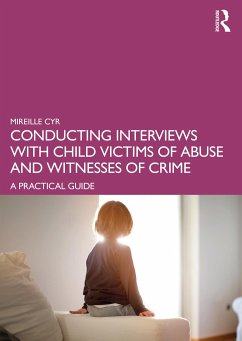This book is a practical and thoughtful guide for the forensic interview of children, presenting a synthesis of the empirical and theoretical knowledge necessary to understand the account of child victims of abuse or witnesses of crime.
It is a complex task to interview children who are suspected of being abused in order to gather their stories, requiring the mastery of many skills and knowledge. This book is a practical one in that constant links are made between the results of the research and their relevance for the interventions made when interviewing child victims of abuse or witnesses of crime and in understanding their accounts. This book also presents in a detailed and concrete way the revised version of the National Institute of Child Health and Human Development (NICHD-R) Protocol, a forensic structured interview guide empirically supported by numerous studies carried out in different countries. The step-by-step explanations are illustrated with a verbatim interview with a child, as well as other tools to help the interviewer to prepare and handle an efficient and supportive interview.
Conducting Interviews with Child Victims of Abuse and Witnesses of Crime is essential reading for stakeholders in the justice, social and health systems as well as anyone likely to receive allegations from children such as educators or daycare staff. Although the NICHD-R Protocol is intended for forensic interviewers, the science behind its development and application is relevant to all professionals working with children.
It is a complex task to interview children who are suspected of being abused in order to gather their stories, requiring the mastery of many skills and knowledge. This book is a practical one in that constant links are made between the results of the research and their relevance for the interventions made when interviewing child victims of abuse or witnesses of crime and in understanding their accounts. This book also presents in a detailed and concrete way the revised version of the National Institute of Child Health and Human Development (NICHD-R) Protocol, a forensic structured interview guide empirically supported by numerous studies carried out in different countries. The step-by-step explanations are illustrated with a verbatim interview with a child, as well as other tools to help the interviewer to prepare and handle an efficient and supportive interview.
Conducting Interviews with Child Victims of Abuse and Witnesses of Crime is essential reading for stakeholders in the justice, social and health systems as well as anyone likely to receive allegations from children such as educators or daycare staff. Although the NICHD-R Protocol is intended for forensic interviewers, the science behind its development and application is relevant to all professionals working with children.

